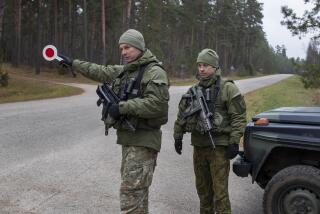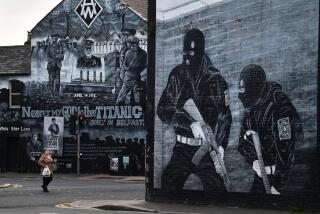Hard Bargain for Merchants on the Border
- Share via
LISNASKEA, Northern Ireland — Along much of the United Kingdom’s besieged border with independent Ireland, running a shop can be a hazardous business. Public notices in the local farmers journal give a sense of the atmosphere.
“Owing to a phone call,” read one from Traynor’s Cafe, “we can no longer serve members of the security forces.” Wrote another owner of two popular fast-food restaurants: “At the request of the Fermanagh Brigade of the Provisional IRA, I Barry McCormack of Silver Dollar Take Aways . . . will not be serving members of the Security Forces.”
The previous Friday, near midnight, those and two other businessmen--two Protestant, two Catholic--had received phone calls to their homes in southern County Fermanagh. The voice at the other end told each man he had been deemed a “military” target for having sold cigarettes, snacks or gas to the IRA’s avowed enemies.
The choice: Stop “collaborating” with local policemen and soldiers, or “face the consequences.”
“A customer’s a customer, whether they’re soldier or civilian. But I’ll have to stop serving ‘em,” said one of the Protestant shopkeepers, a previous victim of IRA bombers in the early 1970s. “I didn’t just put that ad in for bluff. . . . You did what they wanted, or your head was gonna come off.”
Another shopkeeping couple who lives down the road, Peter and Maureen North, had gone on serving passing patrols despite five IRA attempts to intimidate them.
The week before those latest telephone threats, masked men burst into the North’s living room, tied them to a post in a pasture and attached wire from the 62-year-old man’s legs to his wife’s arms. They were warned that a bomb would go off if they moved.
The gunmen ordered the couple’s son to drive a van laden with at least 3,500 pounds of explosives into a fortified army checkpoint. The bomb failed to detonate as the man shouted a warning.
In the wake of that attack, the Northern Ireland secretary of state, Peter Brooke, ordered six checkpoints shut down “in the hours of darkness” to dissuade further “human bomb” attacks.
Many local businessmen are complaining that the move has placed an economic noose around their necks without deterring the terrorists.
The checkpoints, positioned on the main approach roads to the Irish Republic, are actually one to four miles inside the United Kingdom. The situation has brought, in the words of one resident, “a virtual curfew” to those living and working nearest the border.
“In these long winter nights, it’s having a disastrous effect on business life--and it isn’t likely we’re making much in the first place,” said one Catholic news agent, shaking his head.
Near the village of Rosslea, about 80 families are stuck between two checkpoints, effectively barred at night from driving into the village center or beyond to the markets of Lisnaskea and Enniskillen. Other households are finding that they must drive 10 to 30 extra miles by roundabout routes to reach nearby towns.
Army spokesmen won’t comment on the economic effects of the road restrictions. But a soldier standing guard at the Wattlebridge checkpoint, one of those open only in daytime, put the issue bluntly:
“Which is more important,” he asked while questioning a motorist, “the protection of business or the protection of human life? We’ve got people trying to kill us.”
More to Read
Sign up for Essential California
The most important California stories and recommendations in your inbox every morning.
You may occasionally receive promotional content from the Los Angeles Times.










